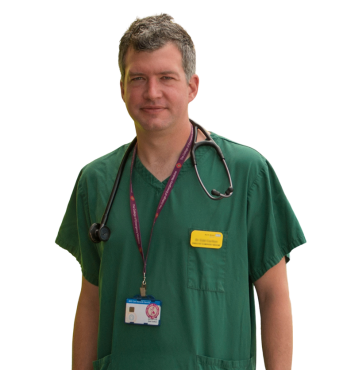
Professor Edd Carlton is a Clinical Academic Consultant and has expertise in conducting research in emergency settings. He joined North Bristol NHS Trust in 2015 and his research interests are broad, including injury, treatment of infection and diagnostics.
What does your role look like day to day?
I’m a Clinical Academic, which is a doctor (or other healthcare professional).This means I split my time between looking after patients and research. I spend half of my time as an Emergency Department Consultant working at NBT. For the rest of my time I work at the University of Bristol. I design and run research trials across lots of emergency conditions and I’m the Chief Investigator for studies across the country. Working in the Emergency Department, I make critical decisions every day about how to save a patient’s life.
I’m extremely passionate about improving the care we give to our patients and I feel that research is key to achieving that
There are so many unanswered questions in how we care best for patients in emergencies. Over the years it has been challenging to conduct research in emergencies, often because patients are very unwell, or they cannot consent to take part. By working in this setting I’ve been able to design research trials that allow patients to take part when they are really unwell.
My biggest project at the moment is called the CoMIT-ED Trial
This is a study looking at how we best treat collapsed lungs after injury. In the past we have treated these by putting a tube (chest drain) through the chest wall to help the lung reinflate. We are looking to see whether more patients can be treated without a chest drain. We are doing this by allocating patients by chance to either receive a drain or hold off and monitor closely. This has lots of challenges because we are going against traditional medical teaching. We need 750 patients to take part and often they have severe injuries. NBT is leading on this project across the whole country and we have 40 other hospitals taking part. We hope that results will improve care for patients across the NHS and reduce the need for an invasive procedure.
How do you move forward when studies do not give the expected results?
Sometimes research ideas are not successful, and you need to try to identify the key areas where you feel you will make the biggest improvement. Working in medicine there are a lot of areas that we could improve.
If you were chatting to a young doctor about research, what advice would you give them?
One thing I would say as a doctor running research studies is to get patients involved in helping you to design your study. Identifying patients to be involved, especially in the Emergency Department who you may only see once, is actually quite difficult. The patient representatives in my projects quickly became an essential part of the research study team and helped us to design our patient information sheets or videos, especially by helping us to explain the study in plain English. One of the key groups I work with is patients who have injuries as a result of knife crime. Working with community violence reduction programmes helps me understand the unique needs of this hard-to-reach group.
What else does a Clinical Academic do?
Being a Clinical Academic is hugely varied. As well as running clinical trials I have lots of other roles. I am a national Professor and support lots of researchers from all sorts of backgrounds across the country get involved in research and develop their careers. I do lots of teaching at the medical school to develop the doctors of the future.
Further information
- Careers in research and active research vacancies at North Bristol NHS Trust
- Support for your research journey
- Our Current Research
